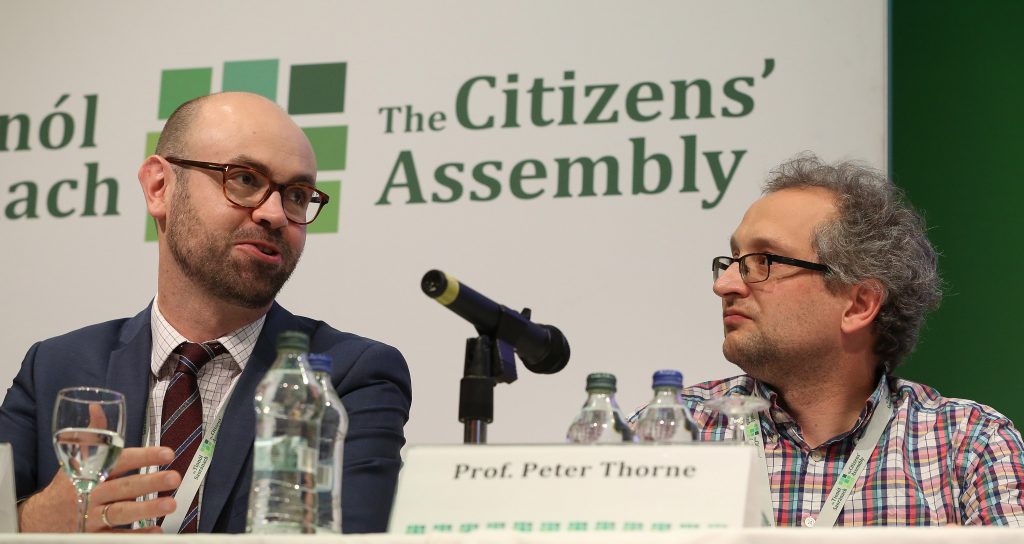Lessons for proposed Citizens’ Assembly on biodiversity

July 10th, 2019
Last May, a major UN biodiversity report gave a stark warning that nature is declining at unprecedented rates globally. Ireland’s National Biodiversity Conference Report lays bare the urgent challenges of protecting biodiversity nationally.
In May, the Dáil committed to establishing a citizens’ assembly on biodiversity loss. What lessons can we learn from Ireland’s recent citizens’ assembly to enhance this proposed deliberative process?
Ireland’s Citizens’ Assembly followed on from We the Citizens (2011) and the Constitutional Convention (2012-2014). These forums have spearheaded some of the most prominent political and societal reform in Ireland, including referendums to amend the constitution on same-sex marriage and abortion.
Irish ventures in deliberative democracy have been praised internationally for their innovation, approach and achievements. The appeal of citizens’ assemblies is spreading. For example, in the UK, Extinction Rebellion includes the creation of a citizens’ assembly as part of their demands for governments to act on the climate and ecological emergency. Recently, six committees of the UK Parliament announced that a citizens’ assembly on climate change will be held in autumn of this year.
Lessons from the Irish experience can provide guidance for Ireland’s proposed citizens’ assembly on biodiversity loss as well as other jurisdictions that are considering running similar initiatives. We focus here on three themes: who was involved, how the process worked and what happened to its recommendations.
Diverse voices
First, the 2016-2018 Citizens’ Assembly chose citizens at random and utilized the input of experts, but a wider range of experts could be included in the proposed assembly on biodiversity.
Ireland’s Citizen’s Assembly included the random selection of 99 citizens, stratified across gender, age, social class and regional backgrounds. This selection was broadly representative of the Irish electorate. Expert presentations ensued and citizen deliberation was moderated by trained facilitators.
Expert speakers were chosen primarily based on their professional expertise and ability to communicate to a diverse audience. While expertise is crucial, the use of well-known TV or radio personalities engaged in environmental issues could aid communication on the biodiversity topic.
A citizens’ assembly on biodiversity could also capitalise on the growing global youth movements for climate action, including Greta Thunberg, Fridays For Future and Schools Strike 4 Climate. These voices should not be marginalized and could be included as impactful testaments.

Public submissions
Second, the process urged the wider public to make submissions prior to the deliberation process, but more use could be made of received submissions.
Over 12 weekends between 2016 and 2018, Ireland’s Citizens’ Assembly deliberated on five topics. Of the five topics covered, the Eighth Amendment received five weekends. How Ireland tackles climate change and the challenges and opportunities of Ireland’s ageing population received two weekends each. Finally, the manner in which referenda are held and the nature of fixed term parliaments were both allocated one weekend each.
Submissions by the public and interested stakeholders were invited for all topics, extending the Assembly’s public engagement reach beyond the 99 individuals. 1,185 submissions were received on climate change.
Participating citizens were encouraged to access a summary ‘Signpost’ document of public submissions prepared by the Secretariat and made available online. However, we do not know whether participants accessed and utilised it. Indeed, the citizens were already overloaded with reading material. They had 21 expert papers to review during their deliberations on the climate change topic alone.
Public submissions could instead be better integrated into the deliberative proceedings for biodiversity loss. A dedicated session alongside the expert presentations outlining the views of publics’ could help give them more prominence and the attention that they deserve.
Follow up
Third, citizens’ assemblies can increase legitimacy of political decisions and actions, but clarity regarding how their recommendations will be handled is important.
The Irish Citizens’ Assembly represented a structured forum for citizen inclusion. It helped to democratise decision-making, co-design solutions and include societal voices in national affairs.
However, there has been varying follow up across the five topics regarding implementation of recommendations that resulted from the Assembly process. Three of its five topics—ageing population, referenda and fixed term parliaments—have received no government response to date.
This contrasts with the timelier and purposeful deliberations on the Eighth Amendment and climate change. Both of these resulted in the establishment of dedicated parliamentary committees to respond to suggested recommendations and bring them further into policy and decisions making processes.
On the one hand, if the exact recommendations of citizens’ assemblies are automatically enacted in law, they would likely run into accountability issues because the outcomes would not come from an elected body. On the other hand, if their recommendations simply gather dust on a shelf, participants as well as the wider public may question the purpose and cost of the process.
The dedicated parliamentary committee model used for the Eighth Amendment and climate change topics represents an appropriate balance and one that the assembly on biodiversity loss could follow.
Ireland’s Citizen’s Assembly was not flawless. However, applying lessons learnt from its process, while also being cognisant of individual topic nuances, can provide best practice models for future assemblies.
By Martha Coleman, Diarmuid Torney, Laura Devaney, and Pat Brereton
The authors are academics at Dublin City University. One of the authors, Diarmuid Torney, was a member of the Expert Advisory Group to the Citizens’ Assembly for its deliberations on climate change.







